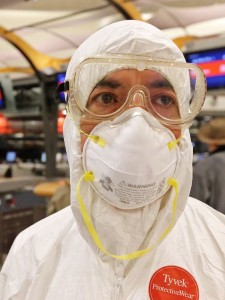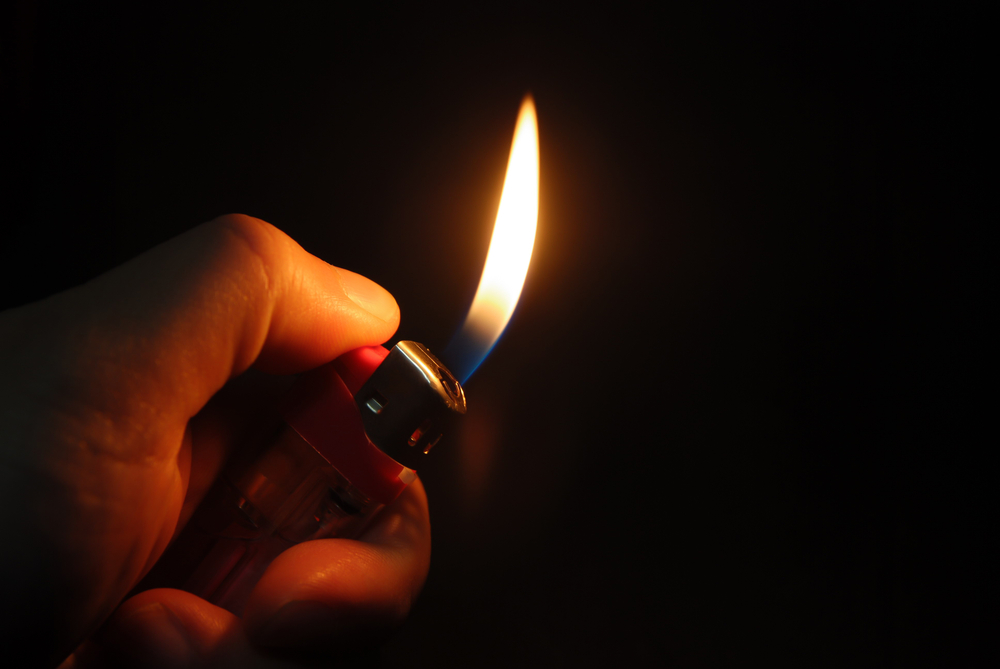Dateline: October 19, 2014—Dallas, Texas
As of now, I am happy to report that the Zombie apocalypse is controlled.
You laugh (I hope), but after three weeks of living at “ground zero” for Ebola in the United States, you would have thought that the “Walking Dead” were parading down Interstate 35. Usually Dallas doesn’t get this worked up for anything other than a Cowboys victory in December, an impending ice storm, or the OU/Texas game. But Lord have mercy, the mix of black people, black people from Africa, and a contagious disease brought out every doomsday prepper and wannabe public health official from Waco to Oklahoma. Oh, I know. Race. Ebola. Must we really go there? Nah. We should, but we won’t. At least I don’t think we will, but hey, my coffee is just kicking in.
Don’t worry; I am not going to deconstruct the media hysteria and fear-generation techniques of the entertainment journalists. Journalism is still undergoing an evolution. I learned a long time ago never to confuse what I see on CNN, MSNBC, or Fox with real journalism. Perhaps this is a perk of working with Pulitzer Prize-winning journalists, outstanding political commentators, and flat dab fantastic beat writers like I do at SMU. I know there are still pockets of excellent journalism, but trust me, the majority of folks in Dallas, especially in the age of Ebola, don’t seem to be reading them.
What is really frightening is how Ebola has exposed the underbelly of the fine, upstanding people of my city. If this disease had reared its head in almost any other American city, I would have expected this Code Red hysterical freakout. But in Dallas, where the level of educational attainment exceeds the national average for composition of college graduates and post-graduates, I frankly thought we were smart enough to get the facts FIRST and freak out second. Coupled with our location as the “right strap” of the Bible belt, I secretly believed that when confronted with Ebola Dallas would have a sensible and compassionate response. After all, hadn’t we learned our lessons during Hurricane Katrina and the AIDS epidemic? Well, to put it bluntly, I was wrong. What the case of Thomas Eric Duncan proved to me, and unfortunately the rest of America, is that Dallas doesn’t have an Ebola Crisis. It has a faith crisis.
In a time when a family not only had to cope with the possible death of a loved one but also of the reality that they, too, might have been exposed to a potentially deadly disease, the silence from the Christian community was deafening. Rather than rallying around the Duncan family, fingers were pointed, hysteria began, and the family was, for the most part, left alone to face a daunting reality.
In the darkest days, the Duncan family found that they could rely not on the African American or even the so-called liberal clergy of Dallas, but on a gracious Baptist minister. George Mason and the Wilshire Baptist Church family became the link to Eric Duncan through his fiancé, Louise Troh. Baptized in the faith early this year, Ms. Troh is an active member of Wilshire. Mason, upon learning that his member was in distress, said his first question was, “Can I visit her?” because he felt that that was where a pastor was supposed to be. Mason, in his account on Huffington Post, makes it clear that neither he nor his church were heroes: “[T]his was no time to focus on Bible stories or parables… it required fast thinking and hard decisions.”
Mason, as an advocate for Duncan and Troh, shared that Duncan did not intentionally or maliciously seek to put anyone–especially his family–in harm’s way when he boarded that plane from Monrovia. He shared a fact long buried by the mainstream media and continuously ignored even now: Duncan only exposed himself to the disease because he was moved to reach out to a woman who had collapsed in front of him. Unable to see her without comfort and care, Duncan placed his life in the balance because he sought to be the CHURCH when others ran away.
Wilshire Baptist held prayer vigils and memorial services. They provided for Troh and her family without reservation or recrimination. Mason and his congregation made me proud to be a Christian; finally, an earthly reason to point the Church as a beacon of hope. Unfortunately, the rest of Dallas was not as proud. As a matter of fact, they were outraged. Mason sadly shared that ALL of the criticism he and his church have received was from outside.
But how could this be? I mean seriously: in a Metroplex in which there are four mega-churches with memberships of over 8,000 each within a 10 mile radius of Wilshire, I know that those congregations and pastors locked arms with Mason and his congregation. Sadly, this was not the case. While Wilshire and our county executive, Clay Jenkins, were showing compassion to the Duncan family, offerings of support or appreciation were the last things on their neighbors’ minds.
Jenkins, the highest elected official in Dallas County, has always had this crazy notion about compassion. When children were left at the Mexican border this summer, Jenkins dared to think that Dallas could be a part of the solution by housing them and providing for them physically AND spiritually. He assembled education, medical, and religious leaders to work to create a holistic solution for the needs of children who were quickly becoming a political football.
I wasn’t really surprised when Jenkins chose to drive a bewildered and beleaguered Duncan family to their new home. No special clothing. No HAZMAT suit. Clay just put them in his car, got them settled, and then picked up his own daughter from school. As a fellow Methodist, I have always been proud of what I believe is Clay’s willingness to live out the most basic of Wesley’s values in his professional life, and frankly I believed that the rest of our members and neighbors would feel the same.
Well, as Lee Courso would say, no so fast my friend. Before you could say “afterschool special” two times, there was an outcry from the parents of Armstrong Elementary where Clay Jenkins’s daughter attends school. The parents accused Jenkins of reckless behavior. After all, just by hugging his daughter and putting her in a car where “those people” had sat, Jenkins was exposing their progeny to a deadly disease. Jenkins tried to reason with his neighbors and fellow church members that there was no reason to fear. He explained that he would never put his daughter or family in danger. He had checked with the scientists and the doctors—it was ok. But they wouldn’t listen, nor did it seem they cared. They had moved to Highland Park to protect their children from the outside world (in Dallas, we call HP the “bubble”) and its dangers, and they were going to be diggy-dog damned if one their own was going to burst the bubble with human kindness and godly compassion.
As Jenkins was vilified, I waited for some clergy member, ANY clergy member to come to his defense. I waited for a public statement of support from one of the four big churches in the 3-mile radius of Highland Park to remind everyone of the need for compassion, kindness, and sober-mindedness as Clay and George were being run over by the anxiety express. I knew that someone would come out and remind these so-called church members that bullying Clay’s young daughter and telling her that SHE is the reason that their children can’t go to school was unconscionable and does not reflect any of the values of Jesus Christ. While my own senior pastor addressed the communal panic in his sermon last week and our Munger Place Church offered a community prayer service, the deafening silence within the community of faith in the public sphere leaves one baffled.
I continue to wait for the billboards, newspaper ads, or public statements that our God is a God of compassion and love, and that those called children of God reflect those attributes. When the WORLD needed to know that the God who gave his only begotten Son was still in the healing business, I waited for someone, some congregation, to stand alongside of Wilshire and say, “Fear Not.” I waited for someone to point out the opportunity we all have to make true transformation possible by supporting any of a number of charities and organizations working hard to keep Ebola from taking any more lives. I scoured websites for links to UMCOR (the United Methodist Committee on Relief), the SBC’s international relief effort, or Samaritan’s Purse. Cut off from the outside world, I waited for the Facebook announcements for book drives, movie drop offs, and grocery runs to support the Trohs and the 74 other people quarantined for 21 days.
I am not scared of Ebola. Frankly, I am more scared of the upcoming flu season, when people really should be quarantined. Just think of the increased productivity if people could or would voluntarily stay home from church, work, or travel when they have the flu and not infect us with a virus that kills over 36,000 Americans each year. But I digress.
I believe that our compassion deficit in these trying times goes hand in hand with a failure to preach the Gospel deficit. We cannot continue to preach about stewardship and social justice if we fail to lift up and demand (yes, I said demand) attention to the most basic tenet of Christianity: To love the Lord God with all our hearts and to love our neighbors as we love ourselves. We cannot continue to allow our congregants to believe that Jesus came to save just “us four,” nor is it acceptable to shun the immigrant, the sick, the minority, or the social leper in attitude or deed.
What I have realized during Ebolapocolypse is that the Church is still doing a terrible job in helping manage the fears of the people. Rather than seeking to limit the emotional carnage that is inflicted when fear runs rampant through communities, the Church continues to occupy itself with building projects and secular politics. Refusing to get all up in the bad behavior (and attitudes) of its congregants, we are happy to take their money, build their gyms, and provide childcare for their children–all without reminding them of the true cost of discipleship. To quote that famous theologian Katt Williams, “The Church used to be a place where you could go to get answers, but now they say, ‘Come on in here and get your praise on, and by all means bring your tithes and offerings! But Boo-boo, if you have real questions, please take those outside and talk to Jesus about them. We can’t help you.’”
Well, never mind. Maybe I expect too much. Maybe I am being too hard on my fellow Christians. No doubt I will be flooded with people who will tell me of the sermons they have preached and money they have donated. Yet for those brave souls who share with me their exploits of kindness, I will ask, “Did you ever write an op-ed to those outside of the church?” “Did you ever think about going in with several other congregations and buying a billboard or a full-page ad with a message of comfort even for one week to the people of Dallas or a note of gratitude or support to Wilshire?”
Then again, maybe I won’t ask. That could just be the coffee talking.












